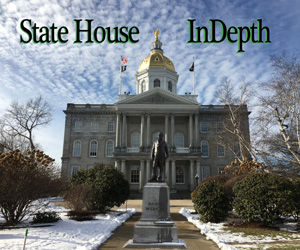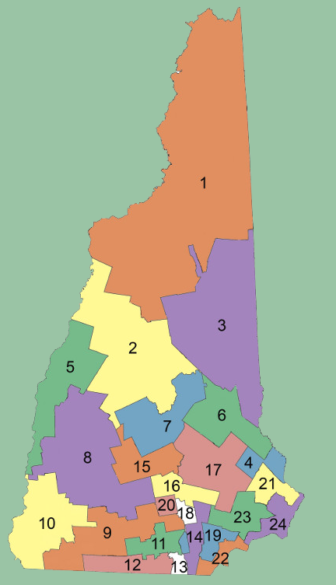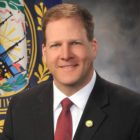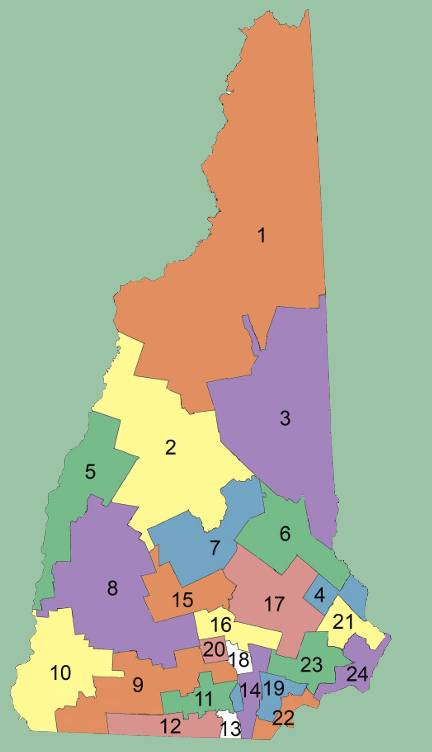By GARRY RAYNO, Distant Dome
CONCORD – Changes in the state’s voting laws received lots of attention over the last two years when Republicans controlled the State House — Governor, Senate and House — for the first time in more than a decade.
Without a Democratic governor to veto proposed changes as both former governors John Lynch and Maggie Hassan did, the new limitations became law although currently challenged in the courts.

Garry Rayno
But what has not changed are the political districts that were drawn almost 10 years ago by a veto-proof Republican-controlled legislature.
Redistricting, as it is called, is a political process and whichever party is in power when the district boundaries are redrawn does everything allowed to retain its advantage. So every 10 years the lines are redrawn to align with the latest census figures reflecting population changes.
For a lifetime Republicans have been in power when the lines were redrawn with one exception, 2002 when a standoff between the GOP legislature and Democratic Gov. Jeanne Shaheen eventually resulted in the state Supreme Court hiring a firm to do the work.

Blue wave
After Democrats rode a blue wave in the last election taking control of all but the governor’s office, the party has to look two years down the road when a presidential election will give members a better-than-usual opportunity to be doing the redrawing before the 2022 election.
How important is it to be the party redrawing the lines? Look at the state Senate.

 Rep. Marjorie Smith, D-Durham
Rep. Marjorie Smith, D-Durham
The prime sponsor is Rep. Marjorie Smith, D-Durham, along with a collection of representatives from both parties and three Democratic state Senators.
The bill would establish a 15-member commission with an equal number from each party and reflect the state’s diversity in terms of political views, gender, race and ethnicity.
The commission would redraw the political boundaries for the two Congressional districts, the five Executive Council districts, 24 state Senate districts, and the districts for the 400-member House.
The plan would need legislative approval and the governor’s signature.
“Our state needs an independent redistricting commission that is free from the influence of political parties or special interests,” said Smith in a recent op-ed piece touting her bill. “New Hampshire needs a commission that is fair, inclusive, transparent, and gives all Granite Staters an equal say in our democracy, and Whether the legislature and ultimately the governor decide an independent commission is needed is an open question. Gov. Chris Sununu recently said he thinks the current system works fine. However, New Hampshire has some problems that need to be addressed, particularly the Executive Council districts, and some of the state Senate districts, along with some large all-community districts that favor one party over the other like Salem, Londonderry and Derry. Hudson and Pelham also have a large two-town district, but Hudson dominates and all the current members are from Hudson and Republicans. “Partisan gerrymandering across New Hampshire is an affront to democracy and the values that we as Granite Staters hold dear,” Smith said. “It’s long past time we fix our district lines, and an independent redistricting commission is the only way forward.” The public hearing should be interesting. Highway Third Rail Traveling north and south in New Hampshire will likely mean contact with a toll plaza whether on the Seacoast or the Merrimack Valley. Many people do not know that lawmakers do not set the toll rates, the Executive Councilors do. With the legislature responsible for all taxes and their rates, you might ask why tolls are not included. The traditional New Hampshire thinking is they are not taxes but a user fee. Someone decides to pay a user fee for convenience or some other reason. And motorists may decide to leave the interstates and travel two-lane state roads instead, but that is likely to cost you time although you will save money. This session, as has happened a few times in the past, several lawmakers introduced a bill to have the legislature set tolls and not the Executive Council, whose members would be more than happy to relinquish the obligation. Raising tolls makes people angry, but transportation officials know periodic increases are needed to maintain and expand the current turnpike system just to adjust for inflation and use. Those periodic increases in tolls that do happen every five to 10 years are far less likely to occur if lawmakers make the decisions. Remember how long New Hampshire went without raising the gas tax — 23 years — although its highway system was crumbling under the weight of too little money. Rep. Michael Edgar Cooler heads prevailed on the House Public Works and Highways Committee which voted 19-0 to recommend the full House kill House Bill 248. “Presently, the Commissioner of the Department of Transportation makes a recommendation to the Governor and Council, who then must act on the recommendation within 90 days,” wrote Rep. Michael Edgar, D-Hampton, vice chair of the committee. “This provides a mechanism to respond to the needs of the turnpike in a relatively timely response and the department’s bonding costs are positively affected by this.” He said the current system works well. Yes and the rest of the Legislature is saying “Thank You,” because the vast majority want nothing to do with setting the toll rates. The House votes on the bill Thursday. State House Bureau Chief Garry Rayno may be reached at garry.rayno@yahoo.com Distant Dome by veteran journalist Garry Rayno explores a broader perspective on the State House and state happenings for InDepthNH.org. Over his three-decade career, Rayno covered the NH State House for the New Hampshire Union Leader and Foster’s Daily Democrat. During his career, his coverage spanned the news spectrum, from local planning, school and select boards, to national issues such as electric industry deregulation and Presidential primaries. Rayno lives with his wife Carolyn in New London. InDepthNH.org is New Hampshire’s only nonprofit, online news outlet dedicated to holding government accountable and giving voice to marginalized people, places and ideas.  Gov. Chris Sununu, R-NH[/caption]
Gov. Chris Sununu, R-NH[/caption]






